I have a real passion for China as if it is in my DNA
It started as a child. Mum was born there, in the French Concession in Shanghai. She would talk about her early life, her nanny—more like a mother—Amah, so I grew up with this special warmth in my heart. My grandfather never really left China; he spent his whole life there, and eventually died in Vietnam. I met Roger Felix once when he came back to the UK, sick with cancer. He beguiled me. He looked Chinese and I nestled into him; he had a smell that was different, something I now know as a mix of incense, Chinese tobacco, and baijiu—white alcohol. China, like a sweet breath running through his soul to mine, Roger’s legacy to me. China always has that warmth.
Years later,
I ended up sharing a home for many years with Wang Ying, a Chinese Canadian in Montreal, Canada, and it was with him that I left for China to work at the Beijing Film Academy, Qingdao campus, in 2015. Unlike many other foreigners working in China, I did not live an expat life—the bars, the uptown compounds in fancy high-rise blocks, and earning lots of money. I was employed by the Communist Party to teach documentary film and earned the same money a Chinese professor would make. I was the only foreign teacher in the school, and other than a few Russians, I appeared to be the only foreigner in Huangdao—Jinshatan Beach.
Wang Ying eventually met lovely Xihu, from the Yi minority, and between family life, filmmaking, and Xihu falling pregnant with Doudoa, I was in heaven.
I was so, so happy.
A dream fulfilled.
Life was cut short from this wonderful adventure
I found I had a brain tumour (non-cancerous). I opted to have the operation in China. It was a success, and I went home in November 2019 to heal. A few months later, the pandemic swept the world awash, and for three years, China shut its borders. I could not get back. My life was left in limbo—my books open on my desk ready to pick up, my clothes hanging in the cupboard, messages to reply to, a film half-finished, a new documentary class to work on. Dreams and plans. My money in the bank, my doctor waiting to review my brain scans.
Stopped. Pulled from under me.
It broke my heart.
I was ripped apart.
My sore little healing brain had to heal on its own as here in the UK I have seen only one neurosurgeon, once, in four years for a check-up.
And so, eventually, comes acceptance
With acceptance, you can embrace the new and carve something from the ashes of what was. I started to dance again, feel good again, dream again, make films again, write again, fall in love with life and art and chance and change. With the blessing to be here to look after my mother, I nursed her to the other side with my brothers and daughter and watched my little Violette grow up.
2024 - present.
This summer, my daughter is working a lot, and Violette, now five, needs lots of looking after. I sit in the front room overlooking Camden Road with a daunting feeling. It rains, and there is nothing more mournful than an eyeful of lukewarm summer rain falling from a lead-grey emotionless sky. How was I going to entertain a five-year-old for three weeks? I envision myself unable to carry the load, the responsibility, no matter how much I had agreed I could, when I flash, you know, those life changing flashes.
Why don’t I take her home, back to China, to where I left off?
Our bags are packed
I cannot sleep; I am so excited. Has it changed? Will I see my doctor? Will Violette manage three weeks eating with chopsticks, playing with Doudao, and hearing Chinese?
Then, before I know it, we are on Beijing Capital Airlines to Qingdao. We are the only non-Chinese on the plane, and soon I feel that wave of soft, gentle collectiveness sweep over me. No matter how many people there are—the bustle, the multitude—there is always a gentle flow, like a soft, low river picking its way over pebbles, running through river reeds, ambling on its way to the big, wild sea….
Vivi is wonderful on the plane, colours her heart out, then falls asleep. When we arrive at the other end, there is Wang Ying. I have not seen my collaborator, my dear friend, my brother, my soul friend, for four and a half years, I cry into his arms; he holds me tightly. As I'm writing, tears are coming to my eyes. Just getting in the car and driving slowly into Tsingtao was like a dream.
I am home… back in our compound in Huangdao Beach, Qingdao City, Shandong Province. The prices haven’t changed, the rents haven’t changed. It's incredible; it is like it was when I left. Yes, there is my book open on the desk as I left it and my clothes are hanging in the cupboards; it is all still there.
Waiting ...
Pivoted from one world into another, transitioned from one life to another. In a strange and beautiful space that is both known and unknown to me. Something extraordinary happens: my Chinese comes back; I am so willing and prepared to speak. It is like I am hungry for it, I need it, I want it, I am desperate for it.
The first thing Doudao does is put her arms around Violette and I knew from that moment on that this was going to all OK. I would be with her 24 hours a day, but there was another little girl for her to play with.
They both have a moon in Sagittarius. One is a Taurus, one has Taurus rising, one is a Capricorn, and the other has Pisces rising. You know, it’s like water, fire, and earth mixing, merging, mumbling, and bumbling along.
Someone asks me before I leave what a Chinese compound is like…
A housing estate with long, tall buildings tipping the sky—China builds upwards, not outwards, due to a lack of space—awash with bustle, traders, and side-by-side stalls. Mopeds, three or four astride. Dancing people, people walking backward, forward, sideward, doing Tai Chi, playing cards, gossiping, swapping recipes, children everywhere, playing in the endlessly inventive parks that adults love too—happy, hopeful, colourful, cheerful, brightly painted.
Homes have large sitting rooms with space to play, with little alcoves where food-stuffs are stocked.
A Chinese compound is a small universe pivoting on its own axis
Aware of other universes yet independent from them. It is home. Here, the community thrives. They look out for each other, clean it up, recycle together, plant luscious plants and trees, and keep the little ponds, which chatter with goldfish, fed and happy. There is no litter, no drug abuse to be seen on the compound streets. Merry, tipsy drinking yes, and many drink the famous Tsingtao beer, sweet-tasting, made from the water that falls from Laoshan Mountain, which encircles Qingdao. Yet drunken disorder is not accepted. It is often associated with domestic violence—a crime since 2015 under the Domestic Violence Law. In 2022, China’s highest court issued guidelines to make it easier for victims to obtain protection orders. (This is one change since I left.)
Xihu, Ying’s wife, has a little nail business run from home—she also resells on Taobao and sells tea from Yunnan (her minority) while looking after Doudoa, who, like Violette, is five and plays the piano at level 3. She tells me that there is no problem having as many small businesses on the go. Very little to no tax.
But, hey ho!
China is young at heart, playful. A child’s carousel. Violette, without batting her long eyelashes, leaps into this child’s adventure as if born here. And Huangdao Beach is the jewel in the hot Chinese summer. On her craggy rocks hide wonderful stones to bring home, my obsession, which I have passed on to Violette and Xihu, to her daughter Dodao. For millennia, China has cherished the practice of collecting rocks, a tradition deeply embedded in the country's philosophical and spiritual heritage. This custom is inspired by the aesthetic allure of natural stones like jade. Stones with unique shapes, often referred to as "Scholars' Rocks" or "Philosopher's Stones," sculpted by natural forces, have also held significant value. These stones are revered as symbols of nature's dynamic and transformative power, admired for their likeness to mountains or caves, reminiscent of the mythical peaks and hidden realms thought to be the dwellings of immortals. From i.rocks - rare earth.
In last month's Substack, I said: I will end this Newsletter with Dylan Thomas. He took me through days in China when I was sad and longed for home. My battered copy of A Holiday Memory would come out, his ode to a hot August Monday in Swansea when, as a child, his family packed up for their day at the beach. I would take my towel to Jinshatan Beach, Qingdao, and lie, listening to the sound of the waves as I was transported back home for a while. (Substack: A Short Summer Soltice Sejourn with Dylan Thomas and A Holiday Memory.)
(This is my Holiday Memory - Huangdao)
So, for now, I leave us on the beach and come back next week with the inner journey where I will delve deeper into the West-East divide through storytelling. I feel ready to express not just my own feelings, which are subjective, but how my friends experience their world, and, there are many disparities.
Yesterday, when I mentioned how happy the seaside folk are, a liberal, left-wing advocate for women in distress sneered and sarcastically responded, "Happy? In their tightly controlled totalitarian dictatorship!"
I usually keep my mouth shut on this narrative as it is deeply complex, but this time, it burst out of me . "Have you ever visited the country? Do you speak Chinese? What do you really know? What makes you think Chinese people can't be happy?”
Here’s an example: Xihu, Wang Ying's wife, comes from an agricultural family and grew up in what she describes as "sheer poverty." Her mother died in an accident when she was young, and her father had to work away from home for years. She basically raised her family alone with the help of neighbors. Is she happy? Does she feel repressed? Is she trapped by her country? No. So, in part two, I will try to explain why someone like Xihu feels happy. But to do this, I need to lift away the Western veil, leave it at the entrance to the writing, and place her in the world she lives in—one she is connected to via her ancestors, and now to her husband’s family, and what that familial link, thousands of years deep, means, before I let her speak…
Thank you for reading and watching. If you have enjoyed this please pass it on.
As always, I LOVE WRITING! And you reading and viewing my work means soooooo much to me.
Have a great week.
There are still the leaden grey skies crying over Camden road, and today, Vivi and I are off to create her China Scrapbook.
Jeanne
Part 2 - next week
I will introduce you to my dear artist friends: Wake, Li, Yuan, and Lin and meet them at a kāfēi diàn—a café—where they will be performing songs, Beijing Opera and guitar and Wake will present a powerful piece protesting the use of young Palestinian children as instruments of conflict by both Hamas and Israel. I'll also share more about Xihu, Mr. Situ, the remarkable film historian, my work with the Qingdao municipal archives, and my interview with state television for my documentary film about my brain surgery.
Here is my Chinese Doc Blog from my first years in China.






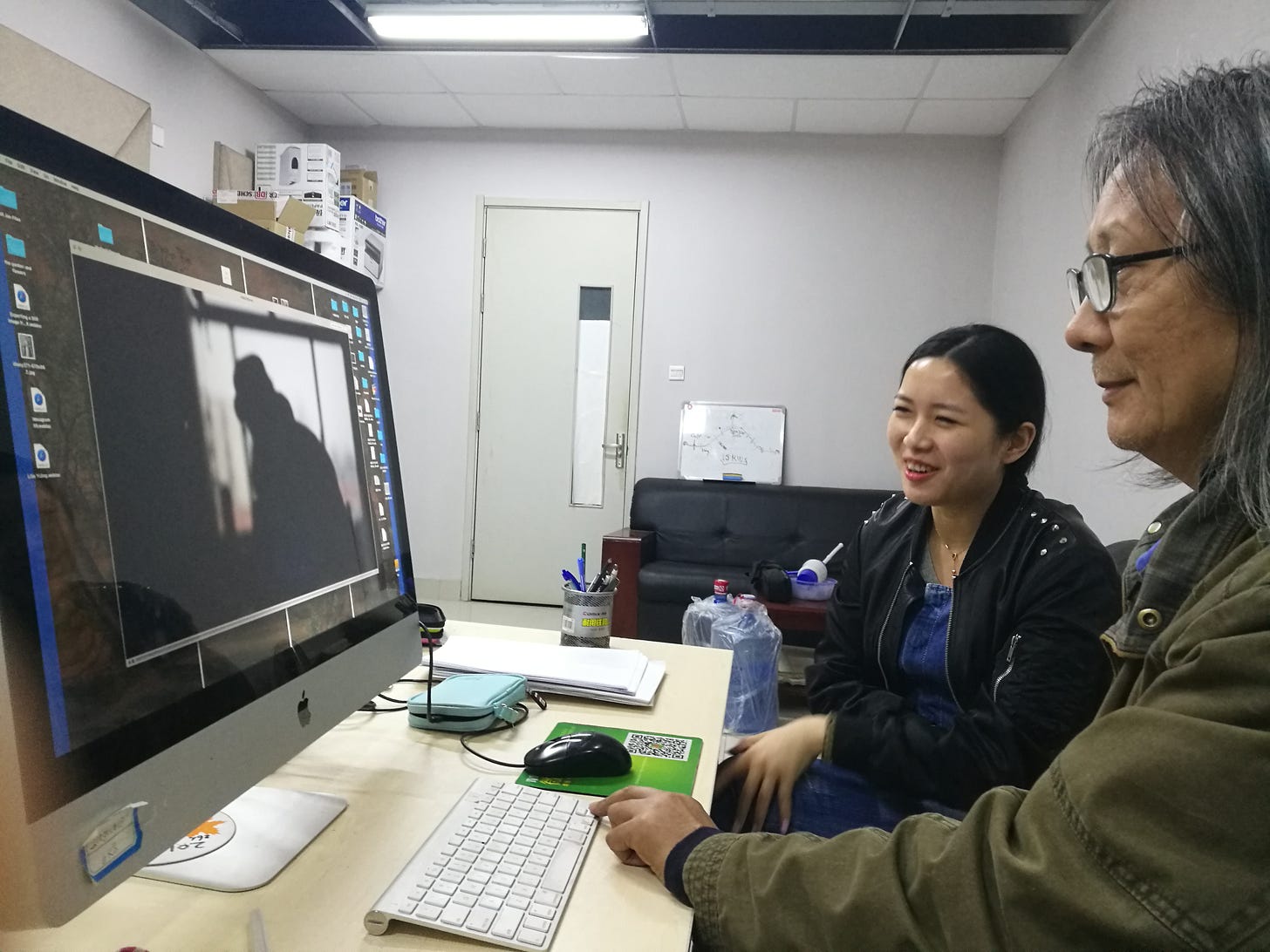
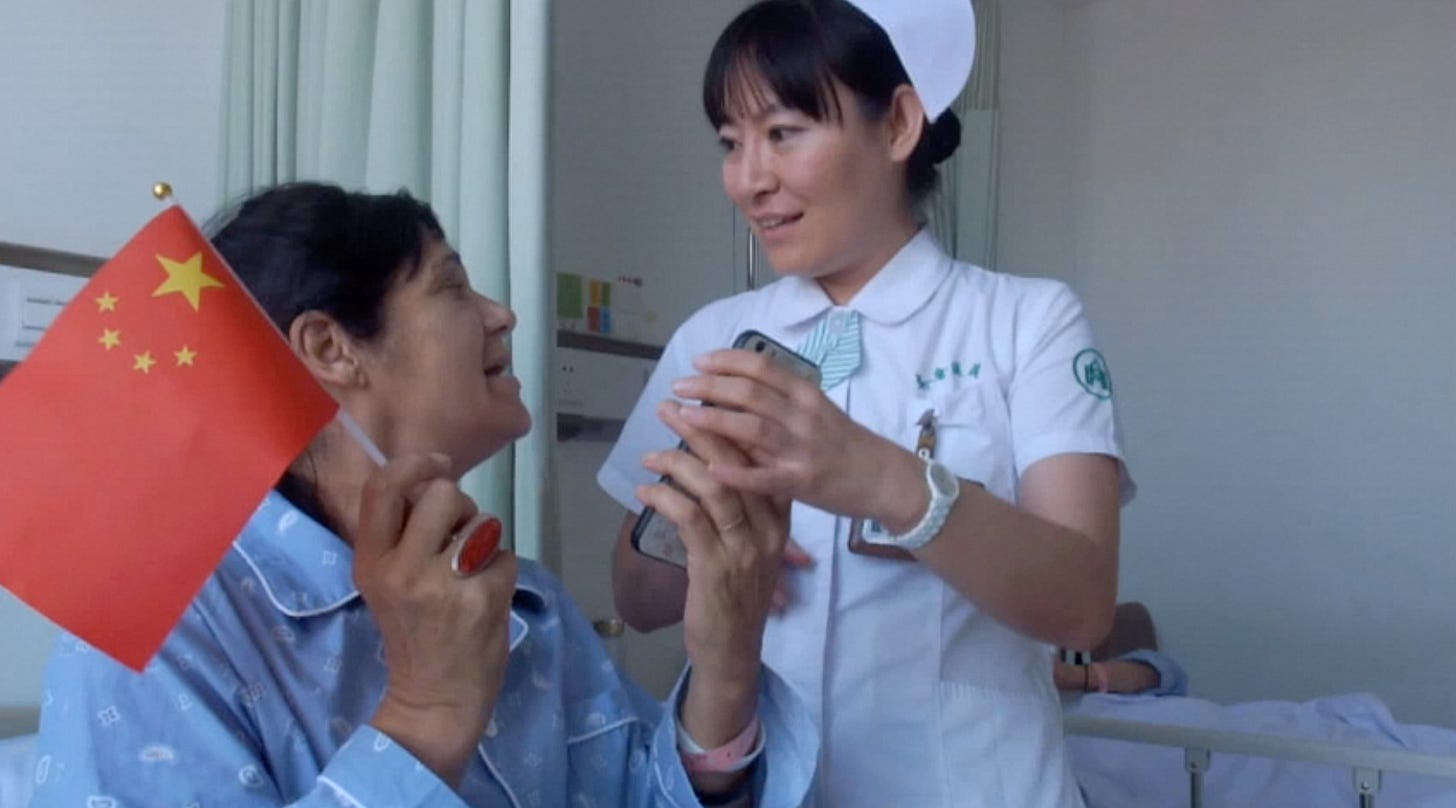

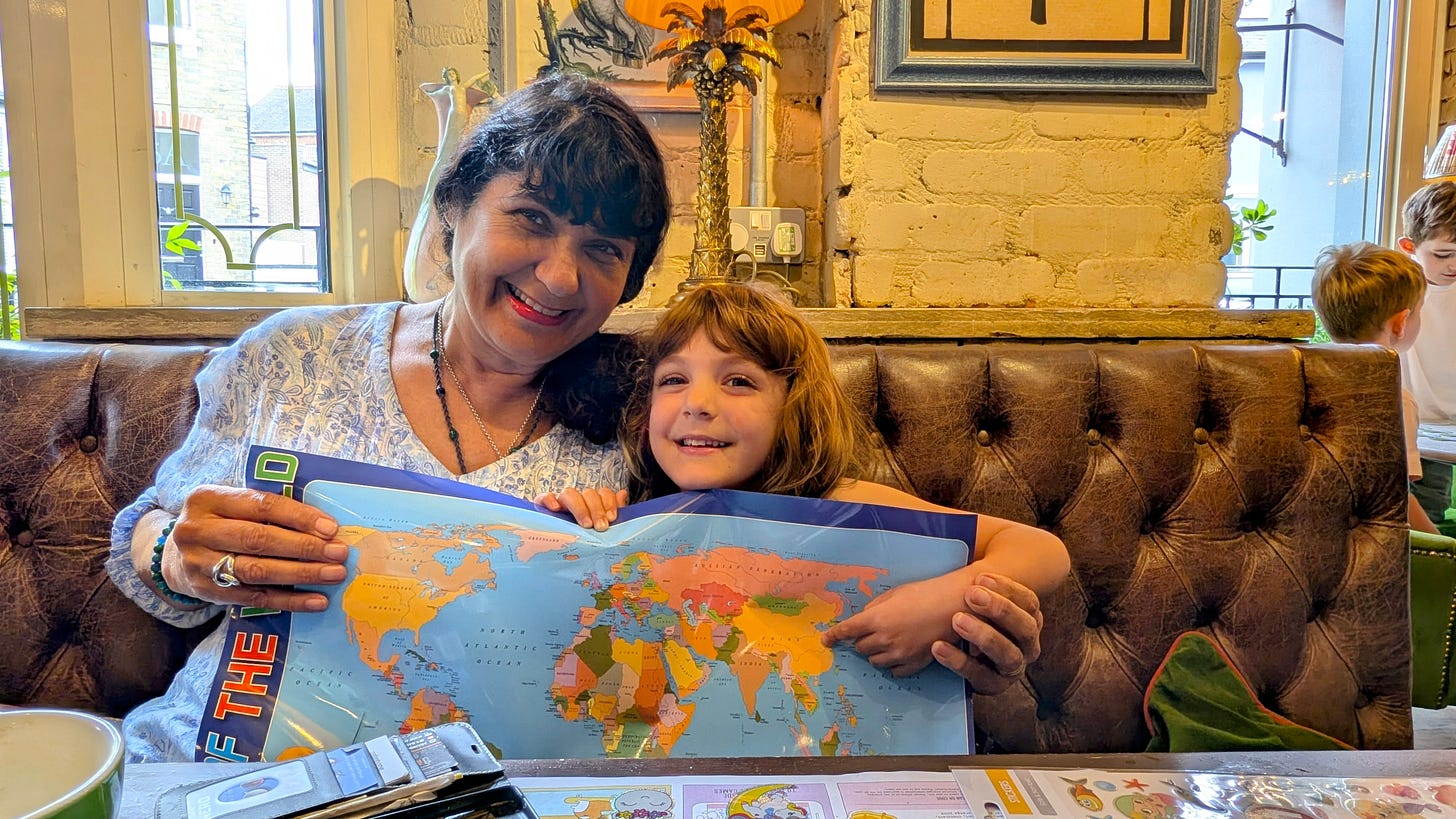
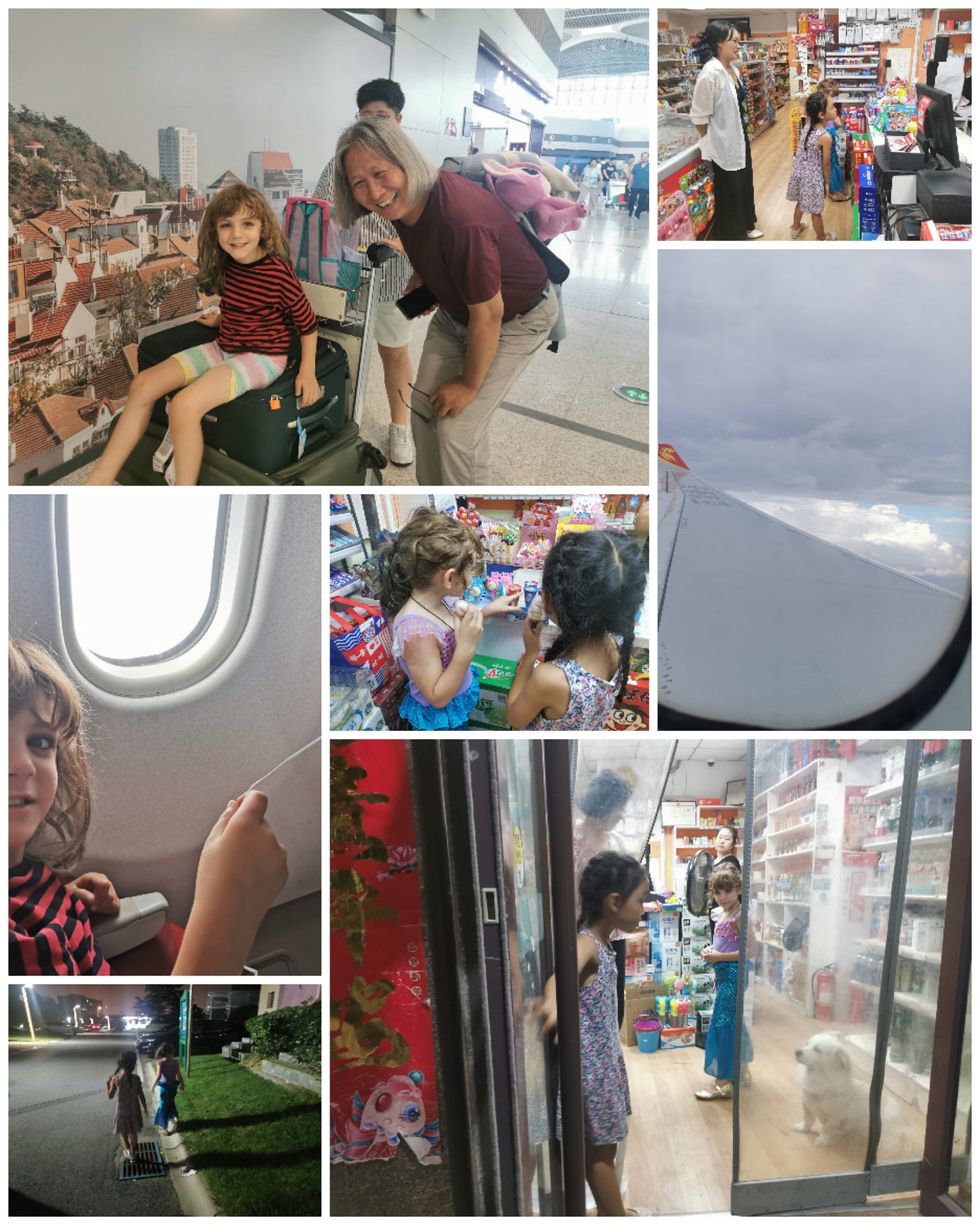


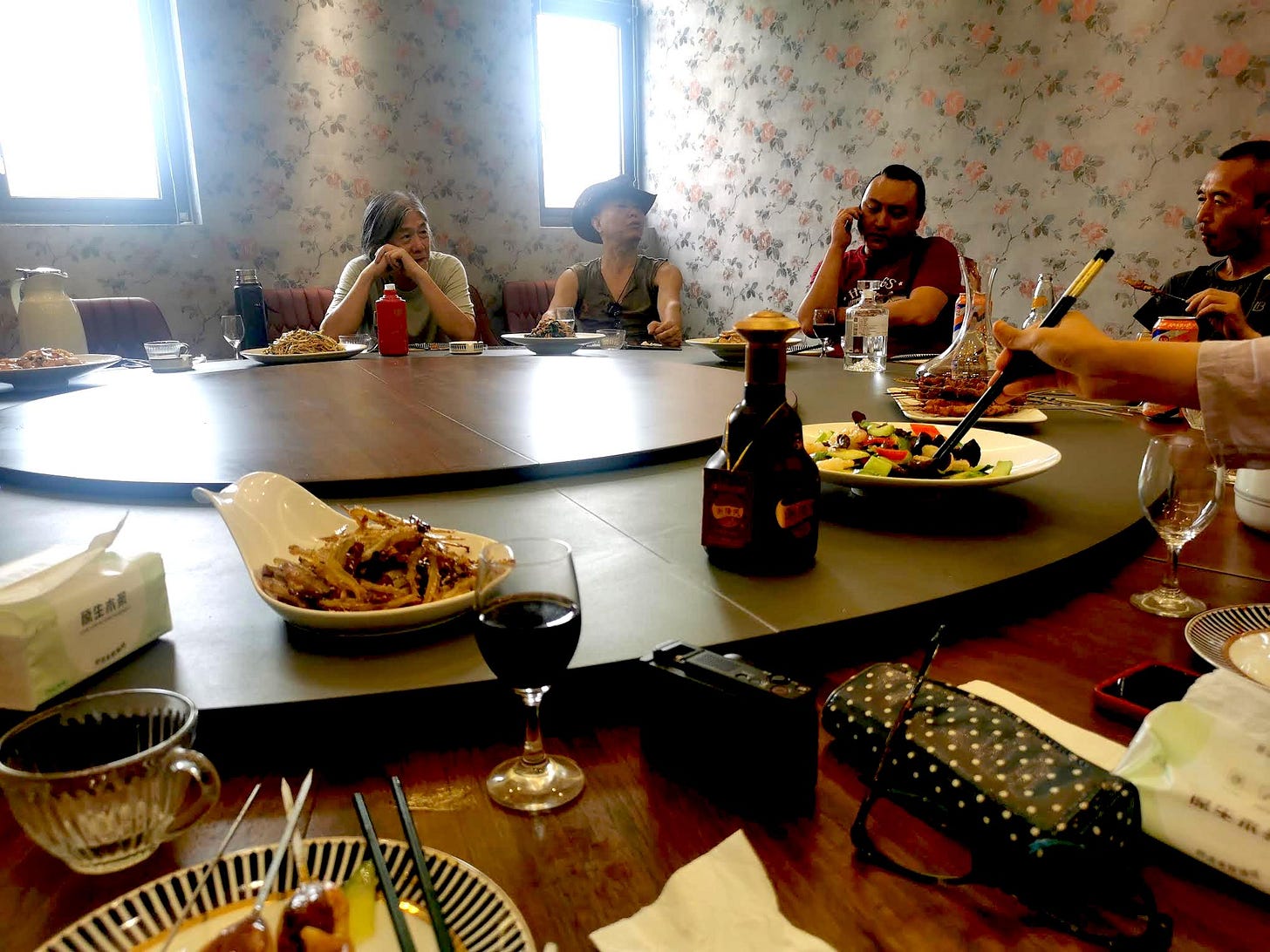
Jeanne, what a wonderful read; I’m looking forward to more! I’m so glad you were able to go back home after so many years and be able to bring Violette with you. The exposure and experience she gets is so valuable and memorable. Hope to visit one day. Cheers.
Thank you Jeanne for showing us the positive side of China, which tends to get such negative reporting in Western media. I wish I could visit Jinshatan Beach. Can't wait to read your next article on China. Andrew